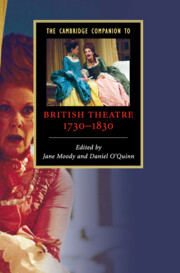5 - The social life of eighteenth-century comedy
from Part II - Genres
Published online by Cambridge University Press: 28 May 2009
Summary
Toward the end of his 'Thoughts on Comedy,' Horace Walpole opines, 'a good comedy, by the passions being exhausted, is at present the most difficult of all compositions, if it represents either nature or fictitious nature; I mean mankind in its present state of civilized society.' Writing during the last quarter of the eighteenth century, Walpole traces developments in English comedy across two centuries, beginning with the 'old comedies' of Jonson, Beaumont and Fletcher, and ending with a meditation on the particular hazards of writing comedy in his own time. Comedy had indeed changed over the course of the eighteenth century, as playwrights left behind the acerbic wit and libertine cynicism of the Restoration stage and, in response to the changing composition of their expanding audience, increasingly adopted what was heralded as a more 'refined,' 'polished,' or 'genteel' tone in their dramatic works. Accordingly, where critical debate during the Restoration and early eighteenth century focused on the divide between humours comedy and comedies of wit, the second half of the eighteenth century featured fierce battles over the relative merits of laughing comedy - which subsumed comedies of wit and humours - as opposed to sentimental comedy, a new dramatic genre that appealed to the middling classes and that highlighted sentiment, exemplary displays of virtue, and ultimately the more emotive forms of sensibility.
For maximum rhetorical effect, advocates on both sides of the debate represented their cause in much exaggerated and often hyperbolic terms. While defenders of laughing comedies, such as Oliver Goldsmith, portrayed sentimental comedy as a 'species of Bastard Tragedy' that had usurped the place of 'True Comedy', and painted themselves as patriotic crusaders on behalf of a uniquely English comic tradition, those who took up the cause of sentimental comedy cast themselves as no less noble and no less besieged.
- Type
- Chapter
- Information
- The Cambridge Companion to British Theatre, 1730–1830 , pp. 73 - 86Publisher: Cambridge University PressPrint publication year: 2007
- 3
- Cited by

